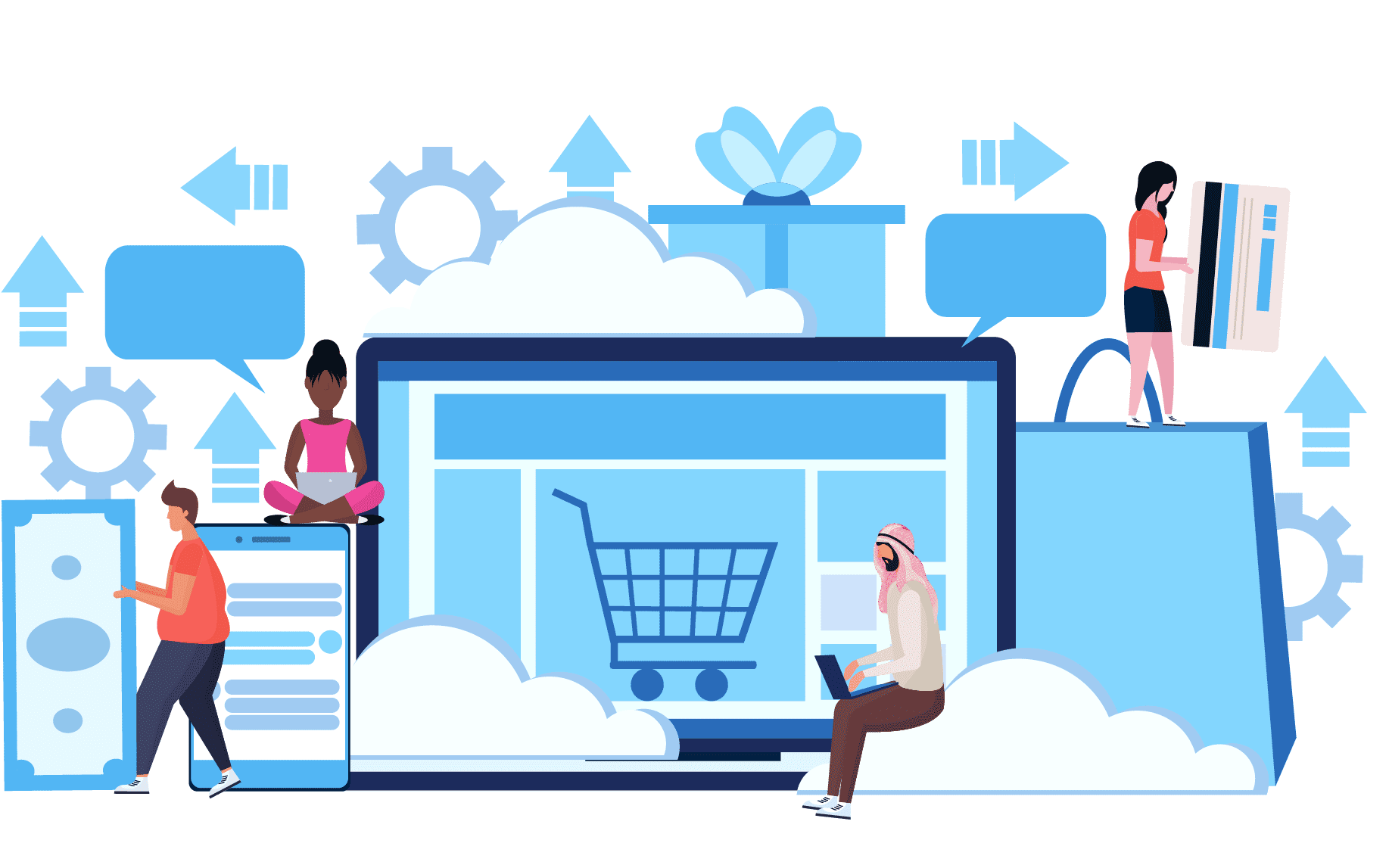Ecommerce primarily refers to the buying and selling of goods or services using the internet. It encompasses a range of activities including online shopping, electronic payments, and internet banking.
On the other hand, ebusiness covers a broader spectrum, encompassing not only online commercial transactions but also other aspects of business operations conducted over the internet. This includes supply chain management, electronic data interchange, and customer relationship management. We will analyze more about the differences in the following article.
What is Ecommerce?

Ecommerce, a term that has become synonymous with modern shopping, refers to the process of buying and selling goods or services over the internet. This digital phenomenon has revolutionized the way consumers interact with businesses, offering unparalleled convenience and a vast array of choices.
In this section, we explore the definition, various models, and key characteristics of ecommerce. At its core, it is the electronic transaction of goods or services. It extends beyond mere online shopping to include other activities like online auctions, payment gateways, and internet banking.
The scope of ecommerce is vast, covering various formats such as business-to-consumer (B2C), business-to-business (B2B), consumer-to-consumer (C2C), and consumer-to-business (C2B).
Different Types
- Business-to-Consumer (B2C): This is the most common model, where businesses sell directly to consumers. Examples include online retailers like Amazon and eBay.
- Business-to-Business (B2B): Here, transactions occur between businesses, such as manufacturers and wholesalers, or wholesalers and retailers. Alibaba is a prime example.
- Consumer-to-Consumer (C2C): Platforms like eBay and Craigslist facilitate transactions between consumers, often for used goods or unique items.
- Consumer-to-Business (C2B): This less common model involves individuals selling products or services to businesses, such as freelance services or stock photography.
Key Characteristics
- Convenience: Ecommerce allows consumers to shop from anywhere at any time, breaking the constraints of traditional store hours and locations.
- Wider Reach: Online platforms enable businesses to reach a global audience, transcending geographical boundaries.
- Personalization: Ecommerce sites often use data analytics to offer personalized recommendations to customers, enhancing the shopping experience.
- Cost-Effectiveness: With no need for physical storefronts, ecommerce can be a more cost-effective option for businesses.
- Speed of Transactions: Ecommerce enables quick and easy transactions, often with instant digital delivery for certain products or services.
Ecommerce has not only changed the way consumers shop but also how businesses operate. It has introduced new marketing strategies, supply chain logistics, and customer service paradigms.
The rise of mobile commerce (m-commerce) and social commerce are testaments to its evolving nature. However, ecommerce is not without challenges. Issues such as cybersecurity, maintaining customer trust, and managing the logistics of delivery and returns are significant considerations for businesses operating in this space. Additionally, the highly competitive nature of online retail requires continuous innovation and adaptation.
| Aspect | Description |
|---|---|
| Definition | Electronic buying and selling of goods or services |
| Models | B2C, B2B, C2C, C2B |
| Characteristics | Convenience, Wider Reach, Personalization, Cost-Effectiveness, Speed of Transactions |
| Challenges | Cybersecurity, Customer Trust, Logistics Management |
| Evolution | Adaptation to new technologies like mobile and social commerce |
How is Ebusiness Different?

Ebusiness, a broader concept than ecommerce, encompasses not only online transactions but also various other aspects of conducting business over the internet. This includes managing internal processes, dealing with suppliers, and engaging with customers through digital means.
In this section, we delve into the definition, components, and strategic importance of ebusiness. Ebusiness refers to the application of information and communication technologies (ICT) in support of all the activities of business.
It goes beyond the mere buying and selling of products and services, encompassing activities like supply chain management, electronic data interchange (EDI), online marketing, and customer relationship management (CRM). This broad spectrum makes ebusiness an integral part of many companies’ overall strategies.
Components and Types
- Supply Chain Management (SCM): This involves managing the flow of goods and services, including all processes that transform raw materials into final products.
- Electronic Data Interchange (EDI): EDI is the structured transmission of data between organizations electronically.
- Customer Relationship Management (CRM): This component focuses on managing a company’s interactions with current and potential customers.
- Enterprise Resource Planning (ERP): ERP integrates various organizational systems and facilitates error-free transactions and production.
Strategic Importance
- Operational Efficiency: Ebusiness systems streamline business processes, reduce errors, and lower costs.
- Global Reach: It allows businesses to reach new markets and customers globally with minimal investment.
- Customer Engagement: Digital platforms enable businesses to engage with customers in real-time, improving service and building loyalty.
- Data-Driven Decision Making: Ebusiness provides access to vast amounts of data, aiding in informed decision-making and strategic planning.
Ebusiness is reshaping industries by driving innovation and efficiency. It offers businesses the tools to compete in a rapidly changing digital world. However, implementing ebusiness strategies requires careful planning and consideration of technological needs, organizational culture, and customer expectations.
The challenges in ebusiness include keeping up with technological advancements, ensuring data security, and integrating digital and traditional business methods. Despite these challenges, the opportunities presented by ebusiness are vast, making it a critical aspect of modern business strategy.
| Aspect | Description |
|---|---|
| Definition | Use of ICT in support of all activities of business |
| Components | SCM, EDI, CRM, ERP |
| Strategic Importance | Operational Efficiency, Global Reach, Customer Engagement, Data-Driven Decision Making |
| Challenges | Technological Advancements, Data Security, Integration of Digital and Traditional Methods |
| Opportunities | Innovation, Market Expansion, Enhanced Customer Service |
What are the Key Differences?
While ecommerce and ebusiness are closely related, understanding their differences is crucial for businesses strategizing their online presence. This section focuses on their distinctive features, impact on operations and strategy, and considerations for choosing the right model for your business.
The primary difference lies in their scope and objectives. Ecommerce is specifically concerned with the transaction of goods and services online. It focuses on creating and optimizing sales channels in the digital space.
In contrast, ebusiness encompasses a wider range of business processes conducted online, including internal operations, customer relationship management, and supply chain management.
Impact on Operations and Strategy

- Operational Differences: Ecommerce operations are primarily sales-driven, focusing on marketing, online transaction processing, and customer service. Ebusiness, however, involves integrating digital technology into all business areas, streamlining processes, and improving efficiency across the organization.
- Strategic Implications: For ecommerce, the strategy revolves around enhancing the online shopping experience, expanding market reach, and optimizing sales conversions. Ebusiness strategies are more comprehensive, focusing on digital transformation, data-driven decision-making, and long-term business sustainability.
How to Choose the Right Model for Your Business?
Selecting between ecommerce and ebusiness depends on several factors:
- Nature of the Business: Retail businesses may lean more towards ecommerce, while companies looking to digitize their entire operation might adopt an ebusiness model.
- Business Goals: If the goal is to boost online sales, ecommerce is suitable. For broader digital integration, ebusiness is the way forward.
- Resource Availability: Implementing an ebusiness model requires more resources and commitment compared to setting up an ecommerce platform.
| Aspect | Ecommerce | EBusiness |
|---|---|---|
| Scope | Online sales transactions | Comprehensive digital business operations |
| Focus | Sales and marketing | Overall business process integration |
| Operational Impact | Sales-driven activities | Efficiency in all business areas |
| Strategic Implications | Enhancing online shopping experience | Digital transformation of the business |
| Business Considerations | Market reach, sales conversions | Digital integration, long-term sustainability |
FAQs
Can a small business effectively integrate both ecommerce and ebusiness models?
Small businesses can start with an ecommerce model to establish an online sales presence and gradually integrate ebusiness strategies. This can include digitizing internal processes and adopting customer relationship management systems.
How does mobile commerce (m-commerce) fit into the ecommerce model?
Mobile commerce, or m-commerce, is a subset of ecommerce that specifically involves transactions conducted via mobile devices. It’s an essential part of ecommerce, considering the increasing use of smartphones for online shopping.
Are there specific security concerns that differ between ecommerce and ebusiness?
Yes, there are differences. Ecommerce security concerns are primarily focused on protecting customer data during online transactions and preventing fraud. In contrast, ebusiness security encompasses a broader range of concerns, including safeguarding internal business data, secure communication between departments, and protecting the integrity of online business processes.
What role does social media play in ecommerce and ebusiness?
In ecommerce, social media is often used as a marketing tool to reach potential customers, showcase products, and drive traffic to online stores. In ebusiness, social media can play a broader role, including customer service, brand building, and even as a platform for conducting business activities like sales and customer engagement.
How important is it for an ecommerce business to have a physical presence?
The importance varies depending on the business model and product type. Some ecommerce businesses benefit from having a physical presence, such as showrooms or pop-up stores, to enhance customer trust and provide a tangible experience.
Summary
The key differences between ecommerce and ebusiness lie in their scope, operational focus, and strategic goals. While ecommerce is sales-centric, ebusiness involves a comprehensive digital transformation of the entire business process. Choosing the right model depends on the nature of the business, its goals, and available resources.
Whether a company chooses to engage in ecommerce, adopt an ebusiness model, or integrate both, depends on its specific needs and long-term objectives. The future of business is undeniably digital, and navigating the ecommerce and ebusiness landscapes effectively will be key to success and sustainability in the marketplace.
